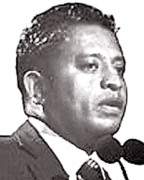ICT
“ICT - platform for good governance, lasting peace in a country”
The President of the CSSL Mahesh Perera said that ICT can be used as
a platform for the good governance, sustainable development and lasting
peace, speaking at the launching ceremony of the 30th National
Information Technology Conference (NITC) organized by the Computer
Society of Sri Lanka (CSSL) held at the Hotel Galadari, Colombo,
recently. The conference this year was held under the theme ‘ICT for
GAP.’ (GAP stands for Governance, All and Peace).

President, CSSL Mahesh
Perera addressing the 30th
NITC-2012 |

Deputy Speaker of Parliament, Chandima Weerakkody addressing
the 30th NITC-2012 |
Delivering the welcome speech at the launching ceremony of the 30th
National Information Technology Conference (NITC), CSSL President Mahesh
Perera said, “The theme of this year’s conference, ‘ICT for GAP’, is
appropriate at a time we are committed for the development of the
nation. ‘GAP’ stands for ‘Governance’, ‘All’ and ‘Peace’. Good
governance, an inclusive society and lasting peace are key pillars of
sustainable development of any nation. ICT is a great enabler that is
capable of making this development paradigm a reality.
“To prove this point, I will share some examples with you.
“Good governance and sustainable are closely associated with each
other. Good governance has many characteristics including
accountability, transparency, responsiveness, and participation, the
rule of law, efficiency, leadership, and strategic vision that promote
sustainable development. Good governance equally applies to both public
and private sector organizations.
“The use of ICT in strengthening good governance, particularly in the
public sector is known as e-governance, and it is known as e-commerce in
the context of the private sector. Whatever the term used, the bottom
line is, an improved value proposition for stakeholders. Therefore,
e-governance can be seen as a distinct value adding system representing
the good governance characteristics mentioned earlier.”
Saying Sri Lanka has arrived at a historic juncture in development
after three decades of war, Perera further elaborated, “Today, we are
witnessing significant development in the country in many fronts. For
example, we have been successful in ending a three decade long terror
conflict on our soil. In terms of the Millennium Development Goals (MDG),
Sri Lanka has already achieved 13 out of 22 targets set for 2015. In
terms of the World Bank’s Ease of Doing Business Index, Sri Lanka has
been positioned 89th out of 183 global economies.
It is no secret that the government has set a target that is indeed
admirable, to raise this position to the 30th by 2016. In terms of
e-initiatives, we do have many success stories such as 1919, e-revenue
license, e-visa etc and now, e-money too. However, to leapfrog to the
next level of development to be the ‘Wonder of Asia’ as correctly set
out by President Mahinda Rajapaksa in the national vision for
development, it is pivotal that an ICT backed governance framework, or
rather e-governance, be established countrywide, giving emphasis on
outputs, outcomes and impacts.’’
Deputy Speaker of Parliament, Chandima Weerakkody, speaking at the
NITC – 2012 launching ceremony said that this government under the
leadership of President Mahinda Rajapaksa is working in the extreme for
the promotion of the ICT field. He said that the government’s aim is
increasing the ICT literacy of Sri Lanka to 75% by 2016.
ICT Agency of Sri Lanka (ICTA), CEO, Reshan Dewapura, clarified the
important role the ICTA has played in the development of the ICT field
of Sri Lanka. He described, at length, the successful projects activated
by the ICTA to date such as the Government Information Centre
(GIC-1919), the Lanka Government Network (LGN), the Lanka Gate, the
Lanka Government Cloud (LGC) and the e-Population Register.
The 30th NITC-2012 emphasized the role of ICT in strengthening good
governance, promoting equal opportunities and sustaining peace. A large
number of famous intellectuals in the ICT field participated in this
conference. Member of Parliament and Economist Dr. Harsha de Silva spoke
on “ICT for GAP: an Economic Development Perspective”, Australian
Computer Society, President, Dr. Nick Tate spoke on “The Future of the
IT Department”,
University of Colombo, School of Computing (UCSC), Former Director,
Dr. Ruvan Weerasinghe spoke on “Technology and Democracy”, LIRN Asia,
CEO, Prof. Rohan Samarajiva spoke on “Connected Nation,” Sri Lanka
Investors Commission, Chairmen, Deepal Sooriyaarachchi spoke on
“Emerging technological opportunities in social transformation,” and
Univesity of Moratuwa, Department of Computer Science, Nadeeja
Abeyasekara, spoke on “Engineering Diaspora contribution to IT
entrepreneurship in Sri Lanka.”
The Computer Society of Sri Lanka (CSSL) was founded in 1976 by a
group of volunteers for the purpose of promoting information technology
and professionalism among those engaged in the field of ICT. During the
past 36 years the CSSL has carried out many initiatives in line with the
objectives mentioned. Today, the CSSL is the visible front of ICT
professionals in the country. This year too the CSSL has a strategy to
promote technology, to empower the membership, to strengthen the CSSL
and to become an active partner in the country’s development drive.
The National Information Technology Conference is one of the annual
events that the CSSL has been committed to since 1982, and carried out
with resounding and remarkable success. Over the years, the NITC has
become one of the top most ICT conferences held in the region. Today the
CSSL marks yet another significant milestone, completing the 30th event
in a series of national annual events, in the history of ICT in Sri
Lanka.
In addition to the NITC, the CSSL is into many other strategic
initiatives. This year, the society will be holding the 23rd National
School Software Competition (NSSC), an island-wide event with the aim of
promoting problem solving and programming talent among school children.
This programme is conducted in partnership with the Ministry of
Education; and students who excel in this competition are sponsored for
the International School Software Competition (ISSC), a competition that
is being held among the countries of the South Asia Region including,
Australia. The society is pleased to announce that this year’s ISSC will
be held in Sri Lanka hosted by the CSSL. IT Master Mind - a quiz
competition among school children; Deyata IT - IT awareness programme
for rural community; Special Interest Groups (SIGs) and Chapters –
professional development programmes are some of the activities lined up
in the society’s annual calendar.
The Platinum Sponsor of the 30th NITC 2012 was CISCO Systems. The
Gold Sponsor was Sri Lanka Telecom and Mobitel. The ICT Agency of Sri
Lanka (ICTA) and the Ministry of Telecommunication and Information
Technology were strategic alliance partners. ESOFT was the Education
Partner while the Print Media sponsorship was extended by Daily News.
Derana TV was the Electronic Media sponsor.
ICT industry needs changes to prevent cyber crime
Sanjeevi Jayasuriya
The prevention of cyber crimes is necessary in moving forward to
derive benefits from the ICT industry in the long run.
“We believe that prevention could be carried out through awareness
and education. There are many programmes and initiatives by the
government as well as agencies to achieve the end results as billions of
dollars are lost due to cyber crimes, Computer Society of Sri Lanka
President Mahesh Perera told Daily News Business.
The legal framework should accommodate the changing needs of the ICT
industry in preventing cyber crimes which has a growth phenomena over
the past few years. There should be a proper monitoring system to
improve on tools and technology to combat crimes, he said.
Sri Lanka participates in international conferences related to cyber
crimes and broadens the horizon on prevention of cyber crimes where
these forums provide a platform to build on ethics and professionalism.
The computer literacy in the country shows a gradual rise in the rate
and more ICT penetration could be seen in the urban as well as in rural
areas. There is over 35 percent IT literacy rate at present in the
country. The “Deyata IT”, the project to bring IT to rural sector has
been successful in increasing the IT literacy, he said. The country has
an ambitious target to reach 80 percent IT literacy by 2016.
This is achievable and we need to increase the use of technology for
the betterment of the society. However, abusive use of ICT is
destructive.
It is necessary to control and monitor social media. Sri Lanka is
leading in the area of early adaptation and we always believe in leap
frog when considering the ICT industry, Perera said. Technology could do
more in the path to become Wonder of Asia and there are equal
opportunities to adopt technology compared to developed countries.
The leverage on technology for GDP growth and efficient business
environment could fuel pace of technological adaptation where complete
ICT penetration would result in development, he said.
Blue Flame Technologies distributor of BROAD non-electric chillers
Sanjeevi Jayasuriya
Blue Flame Technologies (Pvt) Limited was appointed the exclusive
distributor of BROAD non-electric chillers for air conditioning systems
in Sri Lanka and the Maldives.
|

BROAD chillers come in a self-contained package that contain
all the necessary components, making installation and
subsequent moving, if necessary relatively easy. |
The Blue Flame technologies officially launched BROAD’s complete line
of non- electric air conditioners for the Sri Lankan and the Maldives
markets.
BROAD, is the premier non-electric air conditioner chiller
manufacturer in the world, rangng from small residential models to large
institutional and district cooling applications in over 70 countries.
Based in Changsha, China, BROAD has gained worldwide recognition both
in terms of market acceptance and endorsements from the scientific
community for its environmentally friendly and cost effective air
conditioning systems that runs on the simple principle of ‘absorption
cooling’.
Absorption cooling sounds complicated, but it is really very simple.
In the old days, some of us who lived in places that did not have grid
electricity used kerosene refrigerators. The fridges used to keep things
cool by way of kerosene-fuelled flame and heat. The same principle forms
the basic working principle of BROAD chillers, although they provide
much more efficient and much larger cooling performances to meet
industry needs, Blue Flame Technologies Chairman Sanjeewa Wickramanayake
said.
“Absorption chillers, known as non-electric chillers have some
distinct advantages over conventional air conditioning and chiller
systems. Firstly, they can use low grade thermal energy, secondly there
are very few moving parts in the equipment and therefore, reliability is
much higher. The third advantage is that they can use multiple energy
sources such as, waste heat from generators, steam from hot water
boilers, heat from burning biomass or municipal waste or from solar
energy captured in a solar hot water collector. The chillers can also be
direct-fired with natural gas, diesel or furnace oil. When waste heat is
used the impact of using
absorption chiller technology is much more environmental friendly, as
very little or no fossil fuel is used to produce the required amount of
cooling, he said.
The savings from use of absorption chiller technology can be
significant as the cost of air conditioning in a typical hotel runs up
to 50 to 60 percent of total electric cost. The pay back period of the
equipment is around three years where district cooling concept could be
applied in buildings clustered together to enable greater efficiencies
and economies of scale.
Orange to shine in leading brands annual list
Despite a subdued presence in public and brand competitions during
the past year, Orange Electric put up a bold show gaining entry into the
list of honour, celebrating Sri Lanka's leading brands, emerging as the
15th most valuable unlisted brand of 2011.

It is compiled through a Brands Audit carried out by Brand Finance,
the internationally recognized brand valuation company founded in the UK
and 17 countries worldwide.
This year, multinational brands dominated the list with only five Sri
Lankan brands featuring in the first fifteen.
“In light of the fact that 10 out of the first 15 brands in the list
were long established multinational brands, our ranking at 15 is a
noteworthy achievement that we as a company are truly proud of. Which
also means very few – four- Sri Lankan brands were ahead of us.
That is a significant accomplishment and a truly remarkable feat –
considering that the sector isn’t categorised within your average FMCG
sector, and the interviewed persons were business executives-again not
people who will immediately recall the sector let alone the brand!” said
an exuberantly happy Kushan Kodituwakku - Managing Director at Orange
Electric.
Orange Electric commands the lion’s share of island nation’s
lighting, electrical fittings and switch gear market.
Recently, Orange Electric inaugurated South Asia’s first plant for
recycling CFL and Fluorescent Bulbs.
It is best known for producing virtually the entirety of its product
range in-house at its state-of-the-art factory at Meegoda and the
company is widely recognized for its leadership role in uplifting the
country’s engineering and manufacturing sector to bring it on par with
the region.
Seven UoM teams pitch their ICT startups debut
Seven innovative ICT startups was born, as the end result of an
intensive seven-week start-up incubator run at the University of
Moratuwa.
This incubator, known as MIT’s Accelerating Information Technology
Initiative (MIT AITI), is run in collaboration with the Massachusetts
Institute of Technology (MIT) and aims to produce innovative companies
and increase confidence in Sri Lanka’s blossoming ICT market.

At the event, seven teams of young entrepreneurs from UoM will pitch
their ICT startups before an audience of nearly 200 distinguished guests
from industry, academia, and Government.
The event, sponsored by three of Sri Lanka’s major mobile
operators—Dialog, Mobitel and Etisalat, will take place at the Hilton
Colombo Residence this afternoon.
The event is intended to serve as a catalyst for technology
entrepreneurship in the Sri Lankan market which is rich in technical
talent.
During today’s launch, Industry leaders including Dialog, Mobitel,
and Etisalat, and the pioneering entrepreneurs and researchers of
MicroImage, Microsoft Research, and Aureos will provide judging and
feedback on the companies’ pitches and products.
Judges will present awards for outstanding business, technical and
social innovation. For entrepreneurs, however, the ultimate goal will be
to attract seed funding and to apply judges’ feedback in building
sustainable, profitable enterprises.
Within the MIT AITI programme, which began this year on 18th June, a
select group of 34 UoM students have been working tirelessly to build
their own software startups.
The teams have undergone rigorous training in business and technology
with coaching by four MIT-affiliated instructors and by numerous local
entrepreneurs and business leaders.
The startups’ goal has from the start been to create applications
providing innovative solutions to important problems affecting Sri Lanka
and the world. Within the programme, the teams have been tasked with
planning and executing every aspect of creating a startup.
Working tirelessly to get their companies off the ground, these
startups have attracted the attention of brilliant mentors and potential
investors. With great promise in becoming Sri Lanka’s future ICT
industry leaders, these companies today reveal themselves for the first
time.
From 2000, companies in nine different nations across the world have
launched through the MIT AITI incubator programme, which aims to promote
global economic development through cultivating a new generation of
technology entrepreneurs. This year marks MIT AITI’s second annual
programme in Sri Lanka.
Just in Time Group contributes towards better public service
Just In Time (JIT) Group, contributed much towards better public
service by partnering with the ICT Agency of Sri Lanka (ICTA) as its
Technology Partner for FutureGov SAARC Summit 2012.
Joining with ICTA in FutureGov events has been a frequent gesture of
cooperation in the country’s development effort for JIT, a fully owned
Sri Lankan company.
Appreciating the support received for the recent Summit from JIT
Group, one of the largest systems integrators if not the largest in Sri
Lanka, ICTA CEO Reshan Dewapura said: “I’m very appreciative of JIT’s
value addition as technology partner to FutureGov SAARC Summit 2012.
JIT Group has always been in the forefront of Technology in Sri Lanka
and also supported many Sri Lanka causes”.
The Summit was held on 18th and 19th July at Cinnamon Grand Hotel
Colombo.
Just In Time Group, as a company engaged predominantly in the
Government Sector associates itself with large integration projects with
an unblemished track record in all projects. As such it works also with
the world’s Top Ten ICT vendors bringing cutting edge technology
specifically to the Government, Telecommunications and Finance sectors.
Not being limited to the integration undertaken, Just In Time Group
also goes on to do Level 1 and Level 2 support for projects which hardly
any other company does in Sri Lanka.
This in turn creates an in-depth technology transfer and resource
build-up which is world class. Furthermore JIT Group has in its
portfolio its own IPs and success stories unmatched by any other.
Although a company little heard or seen but which believes in
delivering objectives, it is more than visible in its support of ICTA
and the Government in its initiatives.
“You may have seen in the recent past in news items, their many
successes in central switching, core banking, IFRS, Security and Network
, to name a few.
We are very proud to be a contributing force and to be associated
with ICTA to implement His Excellency the President’s vision for Sri
Lanka”, says Kavinda Mahawedage - Head of Marketing for the Group.
In the recent past, they have gone into technologies which will
benefit all cross sectors of business especially the public sector, GIS,
converged infrastructure and mobility solutions.
Both Dewapura and Mahawedage acknowledged the role played by Alphabet
Media in recognising Sri Lanka at the forefront of its roadmap.
Telecommunication and Information Technology Minister Ranjith
Siyambalapitiy graced the inauguration of the Summit as Chief Guest. |



